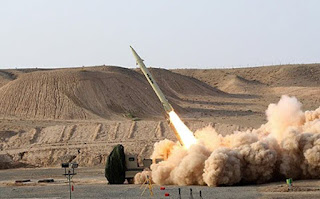I would recommend reading this article
Which is about the right policy towards Iran
freerepublic | Keyvan Salami
On June 19, Iran Launched 7 medium-range ballistic missiles targeting ISIS in Syria. The same day a US Navy Super Hornet shot down a Syrian Su-22. On June 20, a USAF F-15E blasted Iranian Shahed-129 armed drone out of the sky.
The drone was shot down as it advanced toward the coalition-backed rebel outpost of At Tanf, near the southern Syrian border. In addition, Khamenei, Iran’s supreme leader, in a speech, harshly attacked the US and posted hostile tweets. “That US arms a terrorist group is what causes instability. Who created #ISIS? The US!... That the US joined the anti-ISIS coalition is a lie. They're against an unrestrained ISIS but agree with a controlled ISIS…US president accuses Iran of terrorism, while terrorism in this region has American roots…” The supreme leader twitted.
Now the question is if the U.S and Iran are moving towards a military conflict. Iran’s lobbies in the US are trying to say that any measure against Iran would lead to a new conflict in the Middle East, and the war is inevitable unless the West and especially the US recognizes Iran as a regional power and start to negotiate with it, and give its share of the pie. In short, continue the appeasement policy of Obama with Iran. But looking deep in Khamenei’s statements, and also to Iran’s propaganda indicates that the issue is not a new conflict, but on the contrary to contain the main source of conflict in the Middle East, namely Iran and its proxy wars in the Middle East. Iran is terrified of an external and an internal threat, and all their actions and rhetoric are the spinoff of this fear. The external threat is the US-Arab coalition against Iran’s meddling in the region, and the internal threat is the People's Mojahedin Organization of Iran (PMOI/MEK), Iran’s main opposition organization. For 8 years Iran enjoyed the appeasement policy of Obama administration, allowing it to pursue its aggressive policy in abroad, and suppression of its people inside the country. The “Golden years” of Obama is over, an international coalition of Iran’s neighboring countries and US are united to stop Iran’s export of terrorism, and the MeK supporters, have expanded their activates inside Iran. On June 15, 2017 the Senate passed a Bill for more sanctions against Iran and its ballistic missile program. Iran’s officials called the new sanctions as the “mother of sanctions”, referring to the “mother of bombs” which US tested last month in Afghanistan. The new sanctions are the first practical measures of new policy, and the Mullahs ruling in Iran are feeling that the West means business. On the other hand millions of Iranians inside Iran are eager to see the results of the annual gathering of Iranian opposition on July 1st in Paris. The MeK supporters inside Iran have been informing the people about this gathering. In the annual gathering of the MeK over 100000 Iranians from all over the world gather to discuss their mandate, and a number of international officials from the US, Europe and Islamic countries also participate in the program. Launching ballistic missiles, and all the hostile rhetoric of Iran’s officials are in reaction to their critical internal and international situation. These are not neither signs of war, nor signs of a powerful regime, but on the contrary these are signs of a weak regime trying to hide its weakness by resonating show of power in order to save itself from the deadly crisis they are surrounded. The end result is that if we want to prevent another war in the Middle East, the key is not appeasing Iranian regime, but to put more pressure on the regime and support their opposition.




Comments
Post a Comment